Kategorie: ‘Architecture’
Internship in Brussels
- Architecture B.Sc.
- Belgium, Brussels
- BC Architects
- 10/23 – 03/24
The past six months I have lived in Brussels to complete an internship at an architectural office. My decision to temporarily move here had nothing to do with the city or the country though but the specific office I would like to work at: an office focusing on sustainable architecture and earth construction. In July I had a job interview after which I was accepted quite quickly. However, there was not enough time to apply for a full Erasmus scholarship in time. Therefore, I strongly recommend everyone to get all the documents ready as soon as possible.
The hunt for an apartment or flat share went quite easily. I checked on the website „appartager“, finding lots of offers, but I was trying to look for a room in the areas of
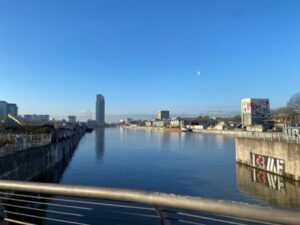
© Lea Knoch
Ixelles, St Gilles and Schaerbeek (a friend of mine recommended). I ended up in Schaerbeek, in a flat share of four people with a very friendly land lady. The location was perfect, just ten minutes from work on the bike. Since all the rooms were free, I did not know who the other flat mates will be… in the end we were all Germans.. At first we were a bit disappointed, since we would have loved a more multicultural experience but soon we discovered that we were super happy to have a little „German home“ far from home. Whether we discussed the pros and cons of German or Belgium beer or the joint hunt for the best bakery in the city (the truth: nothing can replace German bread) we had a really good time together. We spent lots of nights sitting in the kitchen, chatting, cooking or strolling through the city. In the end we became really good friends, I hope to see again at some point. Our favourite activities contained: visiting Schleiper (the place to go as a creative person, 4 stories full of paint, brushes, paper, materials, clay…) visiting (flea) markets in the Marolles and at Gare du Midi and reading books in cafes or bars. Since it feels like its always raining in Brussels, it is important to know nice places you can hide in when it starts pouring.
The city itself is not too big but feels very confusing at times. Brussels undergoes lots of changes at the moment, many architectural and urban developments are happening. Therefore, construction sites everywhere. Plus there really is a thing called „Belgian solutions“, creative ways of finding solutions to problems (sometimes not making sense) and very much in contrast to German solutions.
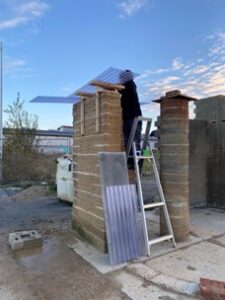
© Lea Knoch
So, unexpected things to happen everywhere and endless opportunities to explore. Although the tram system is super modern, it takes ages to move within the city if you rely on this type of transportation. Having or renting a bike is definitely the easiest way to travel around and most of the times I felt quite safe cycling in the streets.
But be aware, Brussels has some hills, so a workout is included. The neighbourhood I lived in, Schaerbeek, is a very multicultural and multinational area. The Moroccan and Turkish communities are quite large and it was reflected in the streets: lots of mini markets with stacks of fresh vegetables and fruits outside and bakeries with delicious baklava run by some of the friendliest people I have met in the city. Though I did feel like the neighbourhood is also changing, the process of gentrification has definitely started..
My internship started on the 11th of September. When I arrived I was welcomed by my supervisor and a colleague and they gave me a short tour of the office and introduced me to everyone. In the beginning I was quite overwhelmed, thinking I would never be able to remember all the names and finding my way around (although it was not too big, around 30 people working there). The first days I spent reading lots of documents and plans to get an idea of the project I was working on but quite quickly I started working on it. Three weeks later another architect joined the team for it and I very much enjoyed working with them. I was able to work on different things, designing,
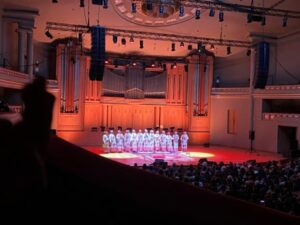
© Lea Knoch
drawing plans, making models and repairing the roof of a prototype pavilion on the site. The atmosphere in the office was incredible, I never wished to be anywhere else. Everyone was super friendly, open and funny. I was also impressed that everybody got along with each other (not always like that with 30 people) and what also contributes this, I think, is the way they create lunch breaks at the office. Since the office is located near the canal of Brussels, a rather industrial area, with not many food places around (plus it it super expensive to eat out in Brussels), they created a system in which every day one person of the office cooks a meals for everybody and at lunch we sat together in the kitchen sharing the food. This way we got a nice, healthy and freshly cooked meal every day plus the opportunity to chat with everyone. Additionally, I can now claim I am able to cook a nice meal for around 25 people within two hours, a skill I never thought I would ever need nor gain!
Unfortunately, my language skills did not improve as much as I had hoped. Although I had four years of French lessons at school I did not remember a thing when I arrived. Since the people working at the office came from different countries, English was the main language to communicate within the office. Most meetings with clients were held in (Dutch or) French. I would say I am now able to understand conversations and read texts but I do not feel very comfortable talking and expressing myself in French. In the beginning I thought about joining a French class in the evening but working full time and more was already tiring and exciting enough. For the future I hope to be able to expand my knowledge since it is an beautiful language and spoken in many countries I am interested in visiting.
The overall experience at the office, at home and the city was very nice. Brussels is an open and divers city and offers activities, adventures and culture for everyone. I can only recommend!
Internship in Paris
- Architecture B.Sc.
- France, Paris
- LAN Architecture
- 04/2023 – 10/2023
After finishing my bachelor’s degree in Aachen, I planned to do an internship in an architecture firm in Paris.
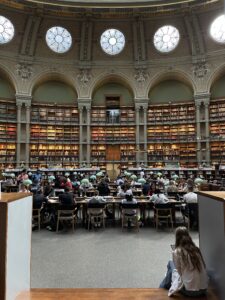
© Anthony Feghali
Reworking my portfolio was time-consuming because I had to translate all the texts into French. I would recommend anyone who has to submit similar application documents to plan enough time for this.
The internship search turned out to be relatively relaxed at first, as I received feedback quickly and didn’t have
to send out too many applications overall.
I had 2 interviews that were promising. What was particularly exciting was that I hadn’t spoken French for
a long time, especially I didn’t know business French. So I spent the week before the interviews talking to
myself, in everyday life to warm up again.
The two offices I liked gave me more or less a commitment in the interview, I just had to get back to them
and confirm. With this information in mind, I decided to opt for one of the offices and wrote to them, but
they replied that they didn’t have the capacity for it at the moment. The second office I wrote to did not
answer me for quite some time, while the time was getting closer and I had to look for flats.
I took a month to look for a flat. It’s difficult to plan longer in advance as most listings are uploaded quite
spontaneously. My cousin living in Paris helped me to find out which neighbourhoods are preferable and
what prices are reasonable. In a city like Paris, there are a lot of flat ads but also a lot of scams, so you
should be especially careful. After I had been looking on the usual platforms for a while, I searched for
ads in Paris on ‘ WG-gesucht’, a German flat platform, and actually found something. German tenants in
Paris often advertise there for possible new tenants. So I finally came across a very nice couple in their
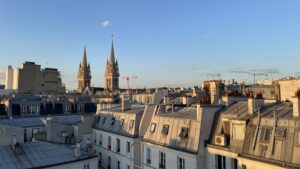
© Anthony Feghali
40s. They both work either in the theatre or in the film sector and therefore know a bit about the cultural
scene in Paris.
My room was about 12 square metres in a 55 square metre flat, which was relatively spacious by Parisian
standards. With a rent of 760€ per month, I was around the upper average. The flat was in the 19th
arrondissement, inside the ring road near the Parc de La Vilette, Paris’ largest park. This neighbourhood
is very well connected and, with its location by the canal and between two large parks, is in a not so
densely built-up area, which is very nice for walking or jogging. It took me no more than 20 minutes by
bike to get to work, and I could ride along the canal.
My employment at LAN Architects lasted 6 months. This office consists of about 25 employees aged
20-40.When I arrived and for the first few weeks I was shocked. There seemed to be a strict and tense
atmosphere in the air. My colleagues were very much among themselves and it was relatively difficult to
get access to them.
The office was largely made up of Italians, as the boss is Italian, which unfortunately often resulted in
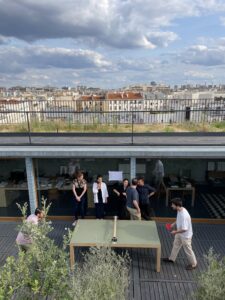
© Anthony Feghali
groupings and conversations in Italian that were hard to follow. I was also not used to their working
hours. A normal day started at 10 a.m. and ended between 7 and 7:30 p.m., sometimes longer or shorter.
Although everyone had a contractual working time of 35 hours a week, they worked overtime every day,
which was rarely recovered. As a trainee, I tried to stick a bit more to the 35 hours, but this didn’t always
work, especially in the beginning. So for the future, I would recommend that aspiring interns clarify the
working hours in advance or any arrangements for overtime. What I had difficulties with in my day-to-day
work were the long hours at my desk. From my studies, I was used to taking my breaks in such a way
that I always had something to move around, but in the office this was not so common.
Gradually, relationships in the office became more relaxed and I began to integrate myself more and
more. This was helped by the office parties that were organised when staff left. Unfortunately, there was a
high fluctuation of staff, as the working environment was not easy, especially with the two bosses. I later
learned that the office is known among architects for having a high work pressure with strict bosses.
So we often went out for a drink after work or did something with some colleagues at the weekend.
Unfortunately, the best time I had with my colleagues was at the end of the internship when it was time to
leave. But that’s probably how it is when you’re there for a short time. The office was planned and built by
the managers. It had a perfect location in the 11th arrondissement on the top two floors with a roof
terrace, so you could eat lunch with a beautiful view over the Parisian mansard roofs.
Since France, unlike other countries, has national regulations for internships, and these can only be
completed as school internships, the pay is also lower than in neighbouring countries. My salary was
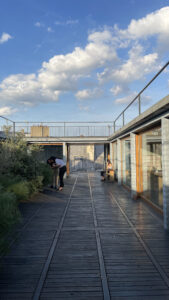
© Anthony Feghali
around 550 € per month. With the Erasmus grant, which was about the same, I had 1100 a month at my
disposal, as my parents paid for my room. I got by on 800 euros a month. The cost of living in Paris is
very high.
This applies to supermarket shopping, restaurants, bars and snack bars. For example, a pint of beer
costs around 8 euros in a traditional pub, and 10 euros in a restaurant. So you couldn’t always afford to
go out for a drink, or you knew the special low-priced bars.
During the working day, I also tried to cook for the week, but that didn’t work for all days, because after
the late end of the working day, you also wanted to have time for leisure and not have to cook again
immediately. But since eating out often cost just as much as eating out in the supermarket, it was worth it
if I was unable to cook. It must also be said that half of the French capital consists of great restaurants
and brasseries that are part of Parisian culture.
One reason that brought me to Paris was the city’s cultural heritage and offerings. I often spent my free
time in the beautiful museums or libraries of Paris or at events such as concerts, jazz evenings or with
friends in the cafés of Paris. I tried to explore a new place or visit a new museum every week. However, I
can say that I only saw a fraction of the city, as it is so rich in things to do and beautiful places to see. At
the same time, you like to revisit places you already like. So it’s a balance act between discovery and
relaxation.
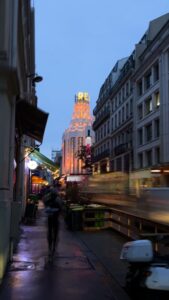
© Anthony Feghali
I would recommend to anyone who is there for a longer period of time not to use the metro and instead
take the bike, and every now and then after work or on weekends try different routes and see where it
takes you. It’s guaranteed that if you keep your eyes open curiously, all sorts of different scenes will
reveal themselves.
I could probably write pages and pages about the city, and about my time here, because the experience
here is very varied. It wasn’t just enthusiasm, but varied from fascination to frustration about the cramped
living conditions, the density or the hustle and bustle of this city. This is probably also part of the Paris
experience. I can recommend a stay here to anyone who speaks some French and is interested in
culture, cities or people. I learned and understood a lot about myself in the confrontation with this way of
life here. Even though I know that I don’t want to live here forever, this time was very special and I would
repeat it.
Internship in Copenhagen
- Architecture M.Sc.
- Denmark, Copenhagen
- Cobe A/S
- 03/2023 – 08/2023
Search and preparation:
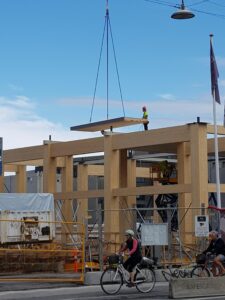
© Leonard Schneider
When looking for internships abroad I quickly came to the conclusion that I wanted to go to Copenhagen. The reasons for that are mainly twofold, with the city being home to an exceptionally broad range of offices being one, and the cities transformation over the last decades into one of the most liveable in Europe being the other. This again is intertwined, as the offices residing in the city both shaped it and are now exporting the Copenhagen brand of urbanism globally.
The architecture office Cobe is one that is deeply involved in these processes as it has designed a range of projects in the city, most notable the master plan for the 30-year transformation of the North Harbour area. I was therefore very happy to be working as part of the design team for half a year.
In applying to Danish architecture firms, it is important to be aware of the early timeline. The semester in Denmark stars before it does in Germany and that plays into the application process usually taking place in October/ November for the spring term and April/ May for the fall term with the internships usually beginning either in February or August, though there often are exceptions if you talk to your prospective office, especially regarding the German semester rhythm.
It might also be good to know, that the large offices often take up to multiple dozens of interns each year whereas smaller offices only have few openings.
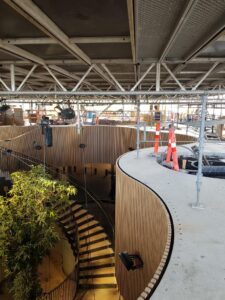
© Leonard Schneider
Finances and apartments:
Financially a stay in Copenhagen is much more viable together with the Erasmus grant, as most offices only pay the equivalent of the Danish student grant (around 900€). Combining both sources of income allows an otherwise self-reliant stay.
Apartments are most commonly found via Facebook groups. There exist a lot of them, and it is important to go through a few to get a feeling of which are currently frequently posted to and whether it is mostly regular people or agencies. Typically, students are looking for apartments under 5000kr. This means cheaper apartments are extremely in demand and super hard to get if you are not able to commit longer than six months. Beware that in my experience and in talking to friends, some of the cheaper offers turn out to be scams. In my case I ended up finding a room in a flat share for around 6500kr, a budget that both extended the horizon of available rooms as well as allowing me to stay within my overall budget as described above.
There also exists the model of either families or older people renting out one of their rooms. I have mostly heard good things from friends about that.
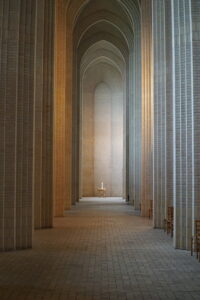
© Leonard Schneider
Also be aware that most rooms are offered on a very short notice. It usually does not help to be looking months in advance, but in the six weeks before going. Contracts are also commonly signed after moving in.
Other formalities:
With moving to Denmark, you also have to register a few things. Those might still take a while, so try to get started as soon after arriving as you can.
First you must get your EU residence form (different process if you are not from the EU), then apply for a CPR-number and then with that you can get your tax-card and Danish bank account. All these are important for you to receive your salary. It might take up to three months, but most offices will offer to send you first pay checks also to a German bank, but not all as that makes taxation much harder for both sides.
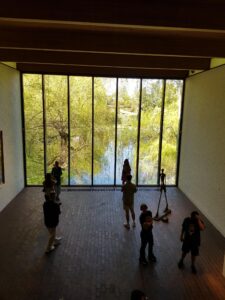
© Leonard Schneider
Work and life in Copenhagen:
One of the biggest factors impacting life in Copenhagen is the season of the year. Depending on the month it might be either one of the most introverted or one of the most extroverted cities.
In the summer months the whole city is humming with people spending time in the public spaces, the water fronts in the harbours, or the many street side cafes and bakeries.
On the other hand, Danes will be snuggling up in their hygge apartments to escape the cold and dark season.
Tastes might differ, but I was very happy with my time spend going straight from the office to swim with the other interns in the harbour after work.
This brings me to my experience at work. I put both work and life into one paragraph as their coexistence was one of favourite things in my time there. Most offices work from 9:00 to 16:30 including a half hour lunch break. This of cause might differ before deadlines, but especially the Danish staff takes their time off very seriously,
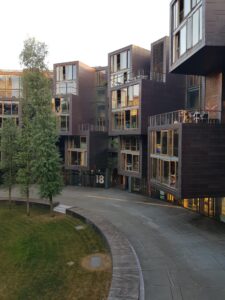
© Leonard Schneider
with even management often packing up around 15:00 on Fridays, resulting in a very healthy work environment.
Additionally, most of my social contacts were from getting to know the many other interns at my office and from there also getting to know some more from other offices in the city. Having this immediate group of people at the same age and stage of their studies as you was a great way to find a place in the new environment.
Regarding my work, I got to help with design of multiple projects ranging from an architectural to an urban scale. For each project the teams and the seating arrangement changed, which helped with getting to know more people.
English is universally spoken, but in looking for an office it might still make sense to get a feel for whether the office is primary presenting itself in English or Danish. This might give and idea of the balance of the workforce being more or less international. Learning Danish is definitely not a requirement, but at least trying to learn while you are there is a guarantee to be on good terms with any Dane you come across. There also are free courses in the city to encourage that.
Internship in London
- Architecture M.Sc.
- United Kingdom, London
- Outpost
- 03/2022 – 03/2023
The following notes are a collection of my experience and recommendations of my Erasmus year in London. I’ve put them in categories to make it a bit easier to potentially find answers to your questions. I’ve tried to keep it relatively broad so it’s not all about architecture and rather a guide to navigating a year in London. More so what to expect to happen in the background rather than specific locations or events. This focuses a bit more on students going abroad and specifically to London as interns rather than students. I suspect the experience will greatly differ depending on whether or not you do your Erasmus exchange as a student or as an intern. Things like accommodation, social life and money are probably where things will differ the most, as students can apply for student housing which will be cheaper than the general housing market (obviously there will be exceptions). Furthermore you will probably have a social circle from the get go, as there will be similar minded people in your courses or even other international students. Lastly you’ll probably not earn any money as a student. Depending on your visa (obviously subject to change) you might not be allowed to work, which can make living in London a little harder.
I really hope you can gain something from this list and that the numbers won’t scare you away from going. The great thing about a big city like London is that there’s always a way to make ends meet.
Architecture internship
- Finding a studio in London can be made slightly easier by following an architectural photographer on instagram as a photographer usually has a wide range
of studios to choose from showcasing their best and most recent works - I recommend calling people to show both initiative and how proficient you are in speaking English
- Studios are usually very busy so emails might get lost
- From experience I can confidently say that to going to a smaller practice will be way more beneficial in getting the right amount of one on one mentoring, more insights into multiple RIBA – stages and better opportunities to get to know your colleagues
- For my internship I applied to multiple studios with natural building materials as that wasn’t covered in my B.SC
“Salary”
- Be aware that the Erasmus grant won’t be enough to support you in London (Probably applies to the rest of the UK as well)
- Try to get a sense of what your potential employer will be paying you to determine how much additional funds you will need
- Aim for at least 700-800 £ as a modest room in zone 2 will cost about 600£ if you are lucky (London prices probably not applicable to the rest of the UK)
- If you’re planning on commuting to work via the tube account for roughly another £150 as travel in 2022 from zone 2→ 1 was 2,50 = 5£ a day
- A British bank account might also be worth considering as a European card might entail a lot fees (I recommend Monzo for this)
- Opening a bank account requires you to have an address. Your workplace address should suffice
Phone
- If you are struggling to get a decent internet connection l can recommend giffgaff as a provider
Accommodation
Important!
If you visit London as an intern and not a student you will find it difficult to find affordable accommodation as you can’t get into student housing!
- Living in zone 2/3 is definitely more than alright & also central enough! It will be a few hundred £ cheaper than zone 1 and offer the same lifestyle
- Be aware that travelling by tube everyday can add up and it might, again, be cheaper to pay more in rent than later on in tube fees as the season tickets are way to expensive
- From personal experience finding a flat can prove to be difficult. This was probably exaggerated by the fact that I arrived in London in early 2022, right after the pandemic, the war in Ukraine and the increase in energy prices resulting in a cost of living crisis in the UK, as well as a lot of migration in London as people were priced out of their current homes and in search for cheaper alternatives
- I would not recommend staying at a hotel for even a few weeks as even the cheap ones will drain your accounts. Try Airbnb to find a longer term solution to have a place to start searching from if you haven’t had the chance to do so before coming to London
- Airbnbs can be very costly as well so try looking in zone 3 if you’re staying in London. Your commute into central might only be 15 mins longer but you will save at least a few hundred pounds per month that way.
- For reference I had to spent almost all of my Erasmus grant in the first two months of staying in London just for accommodation
- Don’t be picky and take what you can get! You can always move later as renting culture in London is very different from Germanys and people are constantly moving. Usually the rooms are already furnished as people leave their stuff behind and don’t buy new furniture.
- Renting can require references from previous landlords. Sometimes it might be beneficial to ask your Airbnb landlord or your employers to offer their contact details as a reference if your future landlord wants to check if you can make your rent on time etc.
- In terms of utilities, be mindful that living in London means having to pay council tax! Depending on which borough, how many people live together and what employment status you have the tax can range from 30 to 150£ per month. ( As a student you are exempted from having to pay council tax, but if you are an intern you might have to pay and if you live with only students you have to pay the full tax that would usually be split with all the tenant that are not students)
Activities and getting to know people
- Starting an internship places you in an unusual situation as you normally work 9-5 which makes it a little harder meeting other people in your age group as they’re usually studying, meaning they probably have a different routine/rhythm
- I found that going to the gym for classes like yoga or boxing etc. can help meeting people after work organically
- Other activities like pottery is also a great way to get creative and meet people in the area
- An app I can recommend for meeting people in a new city is Meetup. Here you can search for different activities or interests and it will recommend events around you. Be careful though and don’t meet at a park at night or sth.
- Another App I can recommend is Dice, it shows you concerts and events in your area and it lets you buy tickets securely directly through the app
- Tuesdays is usually pub quiz night which means during the evening for a small fee people can form teams and try and find the answer to a couple of questions, another great way of meeting new people and usually the prize is a couple of free rounds of drinks
Six-month internship in Vienna
- Architecture M.Sc.
- Austria, Vienna
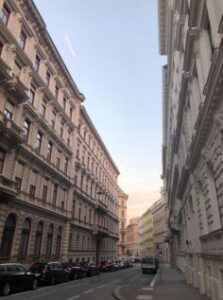
© Amelie Schmitz
- einszueins architektur
- 10/2022 – 04/2023
Preparation:
I applied for an internship at einszueins architektur at the end of September 22 (quite late).
Fortunately, I found a few familiar faces (fellow RWTH students) on the website and therefore had a
little help to get started. A few days later, 1:1 invited me to a very open and cordial online application
meeting. Just 14 days later, I was sitting in the office and had my workplace! Since Vienna has
relatively high living costs, I applied for the ERASMUS + Internship Scholarship, which I can
recommend to everyone. Since I had already been abroad with Erasmus the semester before, I was
well acquainted with the documents and found the application process easy. You can gather your
documents spontaneously at least six weeks before the application. Therefore, it was no longer
possible for me to apply in time, so I could not get the first funding rate. After six weeks, the funding
could begin as planned.
Finding Home:
The search for a flat share in Vienna resembled what I knew from Germany. You can get far with WG-gesucht, but the rush is much higher than in Aachen. The timing of my application was quite bad, so I
had to put up with two interim tenancies (very unproblematic) for the time being. From December
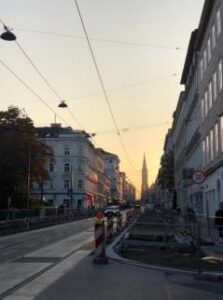
© Amelie Schmitz
onwards, I was able to stay permanently in one place. Vienna is surprisingly cheap (despite being the
capital). You can find all kinds of rooms between 300 and 600 euros. If you are looking for something
affordable, it certainly makes sense not to look in the hottest districts (e.g. 7 and 8). I lived in the 16th
district (Ottakring) and found it very cheap and lively.
Traineeship:
The internship went well, and I am glad to have been at einszueins. Due to the manageable size of 22
employees, I got to know the entire team well and quickly. The bosses attach great importance to a
good group atmosphere, which is why there is an office meeting once a week. Lunch is also freshly
cooked and eaten together in the in-house communal kitchen.
Regarding content, I helped develop a portfolio strategy for Vienna’s first non-profit housing company
and had a lot of responsibility. I was also allowed to help with the competition design for the
Zollhafen in Mainz, which we eventually won. I was understood as an equal team member and rarely
had the typical intern reputation.
Free Time:
The range of leisure activities in Vienna is enormous and varied. Especially art and culture lovers get
their money’s worth. As long as you are under 27 and a student, you can get a reduced rate on many
admission tickets. The Federal Museums Card (59,- for eight different museums) was worthwhile. I
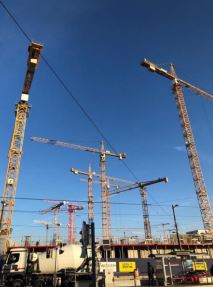
© Amelie Schmitz
attended many theatre and opera performances and various small cinemas with art house films.
Especially in spring, the city wakes up from hibernation, and it’s a lot of fun to explore the area on
foot or by bike. I often went to the Brunnenmarkt on Yppenplatz on Saturdays and enjoyed the sun
there. The Danube Canal is also a little oasis in the city. Everywhere are many authentic cafes and
restaurants where you can pass the time in a tasty way!
Transportation:
Vienna has a reasonably well-developed public transport network consisting of buses, trams, and
underground trains. I opted for the annual pass for 365 euros and canceled it after six months for a
penalty fee of about 20 euros. You get the rest of the money back to travel anywhere for roughly one
euro daily. In addition, I found the offer from the company Eddy Bike excellent. I was able to rent a
high-quality city bike there, which can also be canceled monthly (similar to Swapfiet but local). The
train connections to nearby cities such as Prague, Budapest, or Venice are well-developed and lure
you out of Austria.
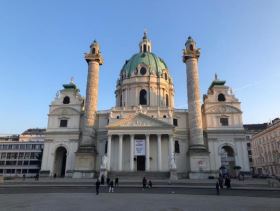
© Amelie Schmitz
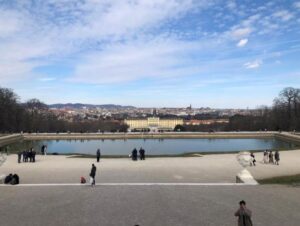
© Amelie Schmitz
Conclusion:
Vienna has proven to be a very liveable city, and I felt very comfortable there. I can imagine spending
more extended time there again or starting my career there. Unfortunately, I didn’t have enough time
to enjoy the nature around Vienna, but I’ve heard it’s also very worthwhile. I highly recommend an
internship in Austria because you have a change of scenery and get to know a different building
culture. Yet, you have hardly any language difficulties and can familiarise yourself with the new
country and working environment. To use the Erasmus+ fund makes much sense to extend the loan
of your internship.
Unexpected chance in Slovenia
- Architecture M.Sc.
- Slovenia, Ljubljana
- Arhitektura Krušec
- 10/2022 – 03/2023
Living in Ljubljana
My internship in Slovenia happened by pure, lucky coincidence. During my last internship in Sevilla in the spring of 2022 I met some Slovene people, among them a university professor for architecture of the university in Ljubljana. I told him that I still needed some more months of internship and he suggested to apply at his office. Since until that point I did not know anything about Slovenia and I really liked the people I met, I decided to take that chance and applied.
I arrived to Ljubljana in the end of September 2022 and had one week to explore the city before the work started. In this week I had the great luck to meet some Erasmus students that came to study for a semester in Ljubljana. Through them I continued to meet new international people during my whole stay, which was truly amazing!
I lived in an apartment right in the city centre, two minutes walking from the Prešeren square. It was in a beautiful old building that I shared with five other students among them also some Slovene students that also became really goof friends of mine. Apparently, I was lucky to find a room that I didn’t have to share because after my arrival I found out that it is a very common concept in Slovenia for students to share rooms. Because of its great location we would often have gatherings at my place.
In the architecture office I had eight colleagues plus the bosses (plus the office dog, an amazing Border Collie). The atmosphere in the office was really good, like they are all friends, and half of my colleagues were more or less my age, which was also very nice for me. They tried to speak a lot of English to include me but to each other they obviously would speak Slovene, which I – surprise – did not understand at all. You do not really need to speak Slovene to live here because most people speak English perfectly, but I wanted to learn at least the basics. For a reason that I don’t know there is a lot of videos on YouTube about Slovene Grammar. If you want to learn this language and have no experiences with Balkan languages, I recommend watching those. Another thing that really helped was getting a book, that I know very well in German, in Slovene. That made it much easier because I didn’t have to look up every word. After the six months of internship, I am still very far away from being fluent in Slovene, but I can read a lot and understand more basic conversations. If you come here, I definitely recommend giving it a try.
The work in the office was diverse. They gave me a lot of different tasks, which I am very grateful for. I was participating in the design phase for new projects, make models, draw execution plans, edit renderings,… I learned a lot of things that I will be able to apply in the upcoming years of my studies.
Apart from the work I had a great time in Ljubljana. Slovenia is very small but has a very diverse and beautiful nature. You can do a different trip every weekend and not run out of nice places to visit. And since Ljubljana is located basically in the centre of the country, all the destinations are reachable in like two hours by car. Very fascinating are for example the Soča Valley, Zelenci Lake, Velika Planina, Bohinj and the Vintgar Gorge. The nature is so abundant and I recommend exploring it even if it is just for a vacation!
Ljubljana is the biggest city in Slovenia and has a population of roughly 280.000 people, which means, considering it is the capitol, it is very cosy. But it is not only the comfortable size that makes it cosy. The centre consists of old but mainly well-preserved buildings, everything is clean and green. Also, the centre is free of cars which is amazing for pedestrians. There are always people on the streets, even in winter people would sit outside of the cafes and restaurants to drink their kuhano vino, mulled wine, next to the fire.
The original plan was to do an internship of three and a half months. But I soon decided to extend it and stay in the office six months. Even after finishing the internship, I will stay six weeks longer now to explore more of this country, enjoy the city and see the spring.
I will keep taking unexpected chances like this one – they might hold something great.
Falling in love with Vienna
- Architecture M.Sc.
- Austria, Vienna
- AllesWirdGut Architektur ZT GmbH
- 09/2022 – 02/2023
In September 2022 I started my 6-month long internship at AllesWirdGut Architekten in Vienna, Austria. As Austria’s capital and its largest city Vienna offers a multitude of diverse activities. Its stunning historic architecture and impressive offer of culture and art made the city so appealing to me.
Before I moved to Vienna, I researched different architecture offices in the city. Finding the right office for me was at first a bit overwhelming, as it was my first experience
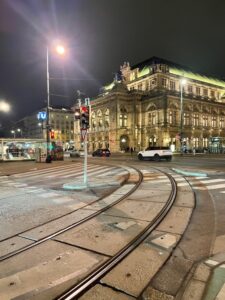
© Pauline Linka
working in an actual office and I wanted to gain insight into various parts of the office life. Furthermore, I wanted to be able to identify with the office’s style. When searching for offices to apply to, I recommend checking out their social media presence. Most offices have an Instagram page, which not only shows their projects but often also gives an insight into the daily work environment and the general atmosphere.
After finding an internship, I started looking for a room to rent on WG-Gesucht. From my friends I know that finding a room can take some time but I found that after investing some time in writing an informative message about yourself and taking part in a few WG-Castings I was able to find a nice room in a great location quite easily. I found a room in the 3rd district, close to the Belvedere and with a great public transport connection to my office. Compared to ot
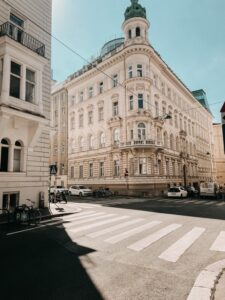
© Pauline Linka
her large cities rent in Vienna is quite low and there are many beautiful his toric apartments available for rent. However, I recommend looking for an apartment with roommates, as single apartments tend to be more expensive and as an added bonus, living in a shared apartment is a great way to make friends when moving to a new city. There are also many possibilities to rent an already furnished room as I did. That definitely made moving much easier. Another important factor when looking for an apartment is the location. In general Vienna’s public transport system is very reliable and well connected, which makes it possible to also move to the outer districts. Nonetheless I would recommend looking for places with in the first 9 districts, they all offer different cultural sights and are very lively and well connected. The 10th district is known to be unsafe and not the most desired living area however over all Vienna is a very safe city and as a woman I never once felt unsafe, even when walking home alone at night.
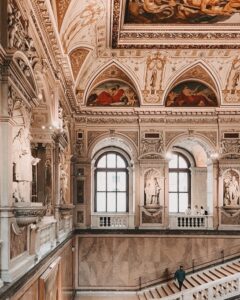
© Pauline Linka
After finding a place to live, there are a few more things that need to be taken care of. The first thing after moving into the new apartment should be a visit to the closest municipal district office to register the new address. My health insurance was covered by my employer and all I had to do was to apply for my Austrian E-Card with my Austrian social security number, however even without an E-Card there are no problems when going to the doctor, they also accepted my German insurance card.
I arrived in Vienna a few to days before my internship started, to get settled and to explore the city. Besides seeing all the major sights, I really enjoyed just walking around and exploring the city away from crowds. Another great way to see Vienna’s sights is taking the tram or Bim as it is called by the locals, the lines 1, 2 and 71 drive by the opera, the city hall, the parliament, the Volksgarten and the Hofburg. While the 1st district is often overcrowded by tourist
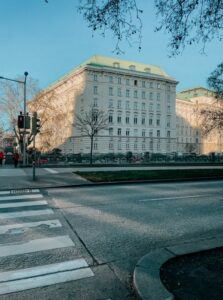
© Pauline Linka
s, checking out the Stephansdom and the Hofburg are mandatory. Besides that there are many famous cafes, bars and restaurants located here. The best Schnitzel is served by Figlmüller, which has three locations in the 1st district. It’s usually booked weeks in advance and a reservation is recommended. In general but especially on the weekend reservations are mandatory to explore Vienna’s diverse cuisine, not only restaurants but also bars, are usually booked fully from Thursday to Sunday. I also recommend trying a piece of Sachertorte or some traditional Kaiserschmarrn at Café Demel, one of the oldest Coffeehouses and bakeries in Vienna. Personally, I prefer the Sachertorte at Café Demel over the one at Café Sacher, but there are entire guides about finding the best Sachertorte in the city. It’s a thing. Also ordering a “coffee” in a Viennese Coffeehouse will get you a concerned look from the waiter and a lecture on coffee, so I recommend ordering a mélange, the viennese version of a cappuccino. However the fact that Vienna besides being voted the most livable city repeatedly is also supposedly the unfriendliest city, cannot be confirmed. Unless you count the waiters in a traditional coffeehouse.
I experienced the people in Vienna as very open and welcoming. I found it was quite easy to make new friends, however I was also very lucky, as there were quite a few interns at the office I worked at, which made it easy to connect with new people.
In general, I had a great experience in Vienna. I really enjoyed working in an architecture office and learned a lot. During the last 6 months a made amazing new friends and fell in love with the city a bit more everyday. Even though I used every free minute after work or on the weekends to see more of the city, there is still so much left to explore. That and the fact that I instantly felt at home in Vienna led to my decision to stay and finish my Master in Architecture at the TU Vienna.
Great internship in an architecture office
- Architecture M.Sc.
- Netherlands, Rotterdam
- studio AAAN
- 11/2022 – 04/2023
Application/Finding an internship
I did my internship with Erasmus+ in the Netherlands in Rotterdam. There I spent 5 months working in an architecture office.
Finding a spot for an internship was definitely time-consuming and at times a bit frustrating. Many offices didn’t respond to my application at all. For me it helped to not only focus on the well-known offices, but to look for smaller ones as well. When one of these offices invited me to do an interview online, I was delighted. It went quite well and they offered me the position right away.
Accomodation & Living expenses
From that point on everything happened very quickly and there was still lots to do.
For example, finding a place to stay. In Rotterdam that turned out to be quite the task. Many people are looking for accommodation in the city, so finding something can be a challenge. I found my place via kamernet.nl, where I got a subscription and messaged as many people as I could every day. You definitely need to be quick, but it’s possible. In the end I scored a room in a shared student house in Rotterdam West. I was really lucky to have great flatmates and I absolutely loved living in West. It’s a really nice area close to the centre where a lot is happening, so I can only recommend checking it out.
Living in Rotterdam can be rather expensive. Rent was quite a bit more than in Aachen, where I study. Also groceries, restaurants, museums and other activities can really add up. While that’s something to be aware of, with my internship salary, the Erasmus+ scholarship and subletting my room in Aachen, it all worked out.
Everyday life/ the internship
The internship was great. It was a small and young team and everyone was super friendly. I felt very welcome from the beginning and genuinely enjoyed going to the office. In my experience Dutch people are very open and their English is fantastic, so it was easy to connect with them. They also seem rather laid-back but are still upfront and share their honest opinion. I really enjoyed that mentality. My bosses taught me a lot about architecture in general and in the Netherlands and my colleagues soon became good friends. After work we would often grab something for dinner or go to the local wine bar. Once a week some of us also went bouldering together.
Free time/tips
On the weekends I would meet friends and explore Rotterdam and the surrounding area. My favourite part about the city are the endless possibilities of activities. There are many great museums and art galleries for example. I would highly recommend getting the Museum card or the Rotterdam pass if you’re interested in that. I didn’t get it and I think I could have saved a lot of money.
I also fell in love with the many markets. Pop-up graphic design markets, vintage kilo sales, the food and clothes market in front of Markthall, the market at Noorplein – there is lots to discover. It’s definitely helpful to follow some websites or Instagram pages and keep an eye out for flyers and posters to find out about the next vernissage, crocheting workshop or forest light installation.
What I will also miss is the huge range of snack bars and restaurants. There are so many different cultures and culinary directions to choose from, it’s amazing.
In addition just biking across the city and looking at the architecture was a highlight for me (if it didn’t rain). Having a bike is definitely a must. I rented a Swapfiets and was very happy with it.
Rotterdam’s nightlife also didn’t disappoint. There are plenty of bars and some great clubs.
If you are interested in daytrips, the Hague, Amsterdam, Utrecht and the sea are all only a short train ride away and there is so much to see!
Conclusion
In conclusion I highly recommend doing your internship in Rotterdam. The city is very interesting and diverse. I met lots of great people and made many valuable memories with lovely friends.
A great experience in Madrid
- Architecture M.A.
- Spain, Madrid
- b720 Fermín Vázquez Arquitectos
- May – October 2022
Living and working six months in the vibrant city of Madrid was a lot of fun for me. I did my obligatory internship in a rather small architecture studio in the northern central part of the city – close to the Bernabeu stadium. I shared a flat with two people in Hortaleza, which is in the north-east between the inner and outer ring, therefore a little bit far from the lively city centre. But it was within a good distance for the everyday commute and for an affordable price. One very important thing to know about living in Madrid is that the public transport system is working really well and if you live close to a metro or cercania station you can move very quickly within the city. If you are under 26 the monthly ticket is more than affordable.
My colleagues at the architecture studio were nice and welcoming. They offered me to speak in English but I asked them to only talk in Spanish with me as I wished to learn as much Spanish as possible during my stay. Even though I did not understand everything on my first days, it did not take long to get used to listening and speaking Spanish all day long. This way I learned a lot and could integrate well in the team. Nevertheless, I would highly recommend a good level of Spanish if you would like to do your internship in Spain.
I have spent the summer term in Madrid to enjoy the nice and hot climate. If I could choose again, I would probably prefer to do an internship of six month in the winter term for two reasons. First, in July and August, it got very hot. Maybe this year has been extreme, but we had a couple of weeks with temperatures above 35 degrees – up to 41 degrees on peak days. Even though every office is supposed to have air conditioning, mine did not because it was broken. As it took until the end of August until someone could fix it, we had to sweat quite a bit. Second, if your office does not make an obligated summer break you are probably to stay while everyone else is leaving Madrid for three or four weeks of vacation. And as people are taking turns, you can find yourself with only very few other co-workers in the office. When everyone came back from vacation, the social life outside the office started to pic up. Not only among the colleagues but also in the whole city. A lot of events happen in autumn in Madrid. So, when the time came that I had to leave, I really did not want to.
Madrid’s social life is inexhaustible. There are always things to do and always events happening. It is almost impossible to find a moment when the streets are empty. Concerning parties, it is probably impossible not to find a bar or club where you can listen to the music you like. You can find all kinds of parties in town. (Even though there is a lot of reggaeton, which was in my favour.) I enjoyed most going out in Cuenca and Malasaña – day and night. Also, even though the river of the city is rather small, Madrid has a lot of parks. I loved spending time at the Retiro Parque and Casa de Campo. But because I lived rather far away from these central parks I often went for a run to Parque Felipe VI. Probably no location where you would go to if you do not live close by, but I liked running there a lot because I had a view of Madrid’s Skyline as well as the mountains in the north of the city. If you search for a nice sunset location, I would not recommend Templo de Debot because it is always too crowded, but rather go to the Lookout at Tío Pío’s Hill.
Madrid is Europe’s highest capital city with about 600m above sea level. I noticed this the most due to the high temperature ranges between day and night. Therefore, it is always recommended to bring at least a light jacket. If you do not need it in the morning, maybe you will need it inside if the air conditioning is too cold.
The last thing that I would like to mention about Madrid is that I appreciated its geographic location within Spain a lot. It is very comfortable to travel from and to Madrid. The distances to all points of interest in all directions are more or less equal. If you book your AVE (the fastest trains in Spain) in advance, it is affordable and allows you to go – sometimes even non-stop – to either Sevilla or Barcelona within two hours. The bus takes about five to six hours depending on traffic conditions.
To put it in a nutshell, I can highly recommend Madrid (and for architects also my studio b720) as Erasmus+ location. I enjoyed the six month there a lot and I hope that I can go back soon. The people I met were wonderful and the food I ate delicious. I have learned a lot in language, professional and intercultural terms.
Copenhagen – A city full of life
- Architecture M.Sc.
- Copenhagen, Denmark
- Sweco Architects
- 28.03.2022 – 30.09.2022
While studying architecture, we have to do an internship before writing our master thesis. I chose to complete mine in Copenhagen. I totally fell in love with the city. Especially during the summer month, its just amazing. The weather was mostly good, not too warm and when the sun shines, the people and the city unfold so much life, lightness and openness. You can see how precious the sun and the light is, as soon as it´s sunny, life happens outside, by the water, in parks, cafés… The city has the perfect size, it´s big enough to fill 6 months with new experience, and I still haven’t seen everything, but you also cannot get lost. There are always familiar corners and sometimes it´s like a little village.
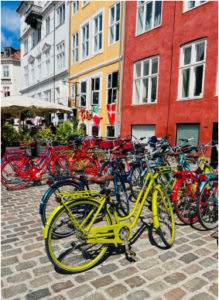
© Amelie Weber
The Danes are sometimes a bit closed, and you have to warm their heart before they let you in, but in general they are always friendly and up to help you. They will be confused if you smile at them without a reason, but it’s a challenge to win them as your friend, and you will succeed. I met so many amazing people, I don’t want to miss in my life anymore. The city is also filled up with internationals from all over the world, you will for sure find a big community from your home country, if you feel like surrounding yourself with people from home. But I recommend mixing it up, Danes, people from your home country, other internationals. That´s what made it very interesting and also informative for me. That’s also a good way for your English to improve enormously. Danes speak English very well, no matter how old they are. It´s very easy to survive with only speaking English and no one will expect you to change that or look at you in a weird way, if you don’t speak Danish.
Denmark, especially Copenhagen, is super expensive. You cannot survive with the Erasmus money only, it needs to be combined with a salary, and in my case my parents also send me money, since the company didn’t pay me that well. In those 6 month I´ve spend around 11.000 euros while having a normal amount of free time activities. Going to a bar and paying 55 DKK (7,40 euros) is normal.
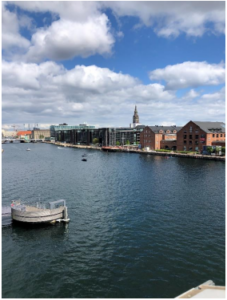
© Amelie Weber
I rented a Swapfiets during my stay and that was perfect. Public transportation works very well in Denmark, but is also expensive. Everything that can be reached by bike in 30 min, is done by bike. The bike lanes are a dream and on your way to work you will probably meet your boss on a cargo bike with some kids in it.
I would recommend to start the search for an apartment in time. The market is super fast. I didn’t have any success with Facebook groups, but can recommend “findroommate” or “BoligPortal”. You will have to pay a fee to use those portals, but for me, it was worth the money because I found the most amazing room and roommate.
If you stay longer the 3 month and earn money, you will have to register for EU registration and CPR number. Do it as fast as possible, the waiting time is pretty long. You will need it, to open a bank account and to get access to the Danish health system. As a bank I recommend Lunar, the waiting time was 2 weeks and everything is online and English. The waiting time for one of the big Danish banks is usually around 6-7 weeks.
For me, those 6 month were the most amazing month of my life and fell in love with the city. I hope everyone else, who is choosing Copenhagen, has the same experience. I can recommend the city very much and the Erasmus money will help a lot. I am very grateful I got the chance to have that money. Last but not least: Enjoy the time!
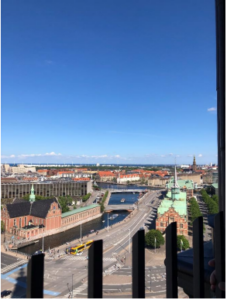
© Amelie Weber
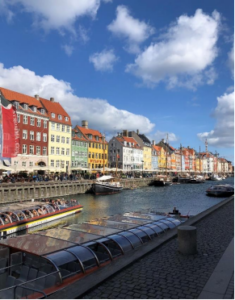
© Amelie Weber

